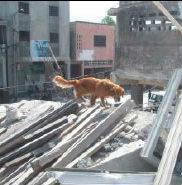The Orange County Register
She emerged from the rubble smiling.
The 50-year-old Haitian woman had been buried for five days before search dogs caught scent of her. She was alert and talkative when she was pulled from the rubble of a Port-au-Prince bank.
It was an energizing moment for rescue workers like Yorba Linda resident Gary Durian, who along with his search dog, Baxter, had been working around the clock in the aftermath of the Jan. 12 earthquake in hope of finding signs of life.
“Especially for the first five to six days, we were working throughout the night and only operating on a couple of hours of sleep,” Durian said. “The exhaustion was hitting us more than the trauma.”
During his 16 days on the ground, Durian saw flattened buildings, bodies lined up in the streets and dump trucks sent out to collect the dead.
But there’s a better memory that remains so vividly imprinted in his mind that the mere mention triggers goose bumps. A memory he hopes will be the one that stays with him the longest: She came out smiling.
And when she did, Haitian locals watching the search efforts gathered around rescue workers and broke out in song.
Rapid response
Within hours of the Jan. 12 earthquake, Durian, a 43-year-old paramedic with the L.A. County Fire Department and a member of the California 2 Taskforce, received a text message alerting him to prepare for possible deployment.
It was a message that Durian and his dog had spent years training for.
Durian and Baxter, a golden retriever rescued from a Northern California animal shelter and trained by the Search Dog Foundation, have been living and working together since 2007.
Durian is a veteran firefighter. He spent 12 years working for the Huntington Beach Fire Department and another three in Vernon before taking a job with L.A. County six years ago.
The pair was deployed to Texas in 2008 to help with the aftermath of Hurricane Gustav. The Texas trip taught Durian about working with his dog in extreme heat and humidity—lessons that would prove useful in Haiti, where temperatures got so high that Baxter had to be given fluids by IV.
“It’s important for me to know that if he is searching a building and he is starting to get tired, he is not going to be as effective,” Durian said.
Durian and his 71 fellow team members, including five other canine teams, were among the first international rescue workers to arrive after the 7.0 earthquake.
They slept in tents on the lawn of the U.S. Embassy, around 1,000 feet away from a helicopter landing pad, the constant sound of military helicopters buzzing overhead.
The noise was constant. Not just at the embassy, but also in the city, where the streets were full of earthquake victims without anywhere to go.
And then there was the smell. Locals smeared Vicks under their nostrils to cover the stench of rotting corpses. Most of the time, the team was in an area where the smell wasn’t too overwhelming, Durian said, but there were moments where the smell swept over them.
“Walking over the rubble, you get to a point where you can tell, ‘There are at least one or multiple bodies here. People died here.’ It’s a smell that’s just very unique,” Durian said. “I’ve been around it a little during my 20 years as a firefighter, but nothing to that extent. That’s definitely something that’s etched into my memory.”
Saying “no”
The American team ate prepackaged military ration meals when and where it could.
“You couldn’t just sit on the curb and start eating in front of people who hadn’t eaten for days,” Durian said. “Even just getting a quick drink of water, you had to do it inconspicuously.”
Durian and his team members had been told not to give away any supplies. They were there to find victims, not to distribute rations and they would have been inundated with people after handing out the first water bottle.
That was easier said than done.
“I would be giving Baxter water and I would have to say ‘no’ to some kid (who) asked me for some,” Durian said. “That was something that was very hard to do and just made me feel horrible inside.”
Even without giving away their food and water, the task force’s rations began to run out toward the end of the deployment.
Rescue workers said it was worth going if they could save one life. In the end, L.A. County rescue workers helped save nine.
But there may also be a benefit for Californians to the long and arduous rescue mission. Emergency responders from an area constantly braced for “the big one” got hands-on experience with what it really takes to search for victims in the aftermath of a catastrophic earthquake.
And they learned a few things they didn’t know before.
One of the reoccurring challenges the canine search and rescue teams faced in Haiti was so-called “pancake” collapses, where the floors in five- to six-story concrete buildings collapse on each other, leaving possible live victims on the ground floor trapped beneath the flattened building.
A pancake collapse is hard to create in training scenarios, so the dogs had little or no experience searching for live victims under so many layers of concrete.
Canine teams returning from Haiti are working with the Search Dog Foundation to simulate that scenario in a new training center.
“It’s going to change the way we train,” Durian said.
Homecoming
After 16 days in Haiti, Durian said he could see signs of recovery. Children were playing in the streets, shops were opening, street vendors were hawking their wares.
Still, the long deployment was wearing on the team.
“Everybody was definitely ready to come home,” Durian said.
The California Taskforce 2 returned to Southern California on Thursday night, just in time for Durian to celebrate his youngest daughter’s 16th birthday.
Working as part of a canine search and rescue team means constant training, which can sometimes put a strain on Durian’s wife, Cristy, and four children.
“Sometimes it’s hard for the family that he’s gone so much for the training,” said Durian’s daughter, Timmarie, a senior at El Dorado High School. “This kind of validated and made it all worth it, that he can use those skills to help people.”
The L.A. County Fire Department gave returning team members a week off from work, and has assigned them grief counselors to help them work through any emotional issues they might have after the deployment.
Durian said he realizes it may take some time before the trauma of everything he saw really sets in. That doesn’t make him hesitate about whether he would want to deploy for another catastrophic disaster.
“Absolutely.”
By Jessica Terrell


